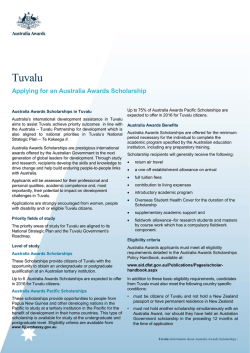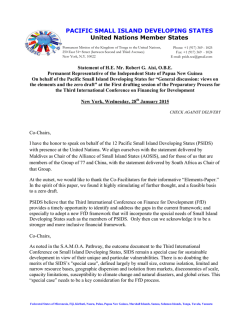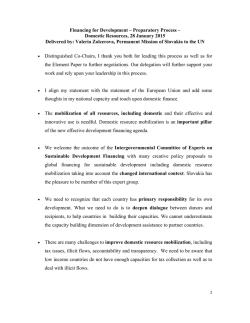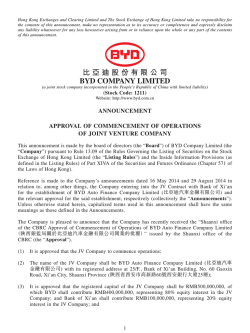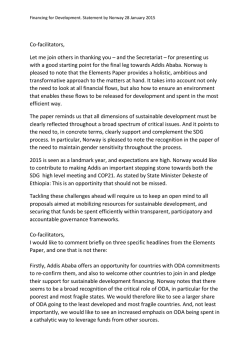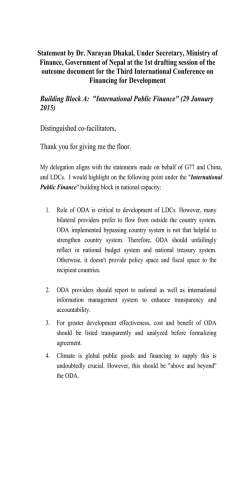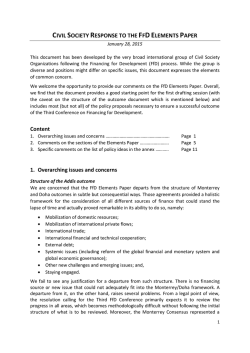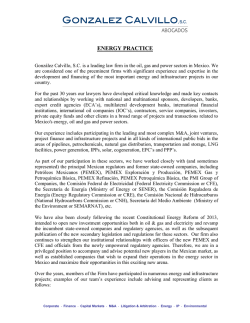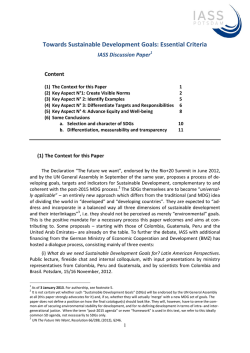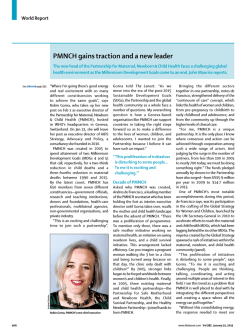
TUVALU STATEMENT to the First Drafting Session of the Third
TUVALU STATEMENT to the First Drafting Session of the Third International Conference on Financing for Development Presented by: H.E Mr. Aunese Makoi Simati Permanent Representative/Ambassador of Tuvalu to the United Nations January 27-29, 2015 New York Please check against delivery 1 Thank YOU Co-Chairs; thank you for convening this important Financing for Development Preparatory Meeting. Allow me to take this opportunity to congratulate you both and your able team, for your leadership, in advancing this critical agenda of how to implement our SDGs, especially with regards to moneytalks (no pun intended). Co-Chair - Tuvalu associates itself with the statements made by the distinguished Chairpersons of PSIDS and AOSIS. Co-chair, our meeting today augers well with last-weeks stocktaking discussions of the Post 2015 Development Agenda, and in these exchanges, we should craft inputs for a zero draft for negotiations at Addis Ababa; and therefore framing the MOI for the Post 2015, come September. We certainly have excellent foundations to work from in the Monterrey Consensus, particular on financing the activities of our agreed Goals for the next 15 years. The MDGs have also blessed us with credible lessons, and we can only do more and do it better to be more innovative and transformative to positively advance our universal goals as well as progressing our different status quo pertaining to our national developmental, political, economic and social advances. My delegation would like to make the following contributions to how we can enhance the protocols of financing for development, for marginalized societies like Tuvalu. Some if not most of these, are articulated clearly in other frameworks like the Samoa Pathway for SIDS, and the IPOA for LDCs and many other parallel constructs. 1. Tuvalu fully support the notion that all sources of finances and combinations of; to be utilized for SDG activities. However, the donor pledges to committing 0.7% of GNI to AID and Developing Countries should be fulfilled and honored. 2. The main debate that development should be country driven, and predominantly financed from domestic sources is logical, for purposes of ownership, coordination and capacity enhancement. Logically also, is the fact that adherence of partnerships to the local development planning priorities as developed by communities and respective Parliaments and governments is paramount. Universal goals are encompassing, but they should be aligned and adhere to country designed priorities and activities. Failing that, will leave many behind. 2 3. UNIVERSAL GOALS should also be contextualized to conform to regional dimensions and most importantly to the specificities of nuanced national circumstances. Past successes in the MDGs - projects and partnerships, fashioned and oriented to local realities, have been more impactful and effective at the ground level as compared to externally influenced interventions. 4. Any Climate Finance must be additional resources to aid the fiscal/financial policies of highly vulnerable poor countries. They should be additional because sea level rise, is not a localized invention and SIDS like Tuvalu and other coastal areas and impacted populations, should be externally supported financially, to cope with these cost additionalities. We, like many other frontline countries just do not have the capacity, budget, reserves and wherewithal to meet climate change cost-additionalities given our resource scarcity and confined economic development options. 5. Ease of accessibility to Climate Finances in GCF or GEF for example is fundamental. There is no point in promising so much resources for climate change projects and then overwhelm them with bureaucratic processes and institutions. Regular reviews of the accessibility and effectiveness of these resources (Funds) should be built into the Review framework of SDGs to gauge if resources actually are game-changers at community level or if these resources are financing a burgeoning middle-men; middle-institution confederacy to compromise their grassroots-effectiveness; as also reported by DAC. 6. If the problem is that these environmental climate funds need highly accountable and transparent and good governed projects or institutions in the recipient countries; many frontline communities like Tuvalu have highly developed-internationally-recognized, Tuvalu/Donor-governed sovereign fund Tuvalu Trust Fund. Many peer reviews of sovereign funds with high acclaims have been undertaken by the World Bank, Asia Development Bank, Commonwealth Secretariat and ESCAP. If we chance the utility of all sources of finance permutations, do not ignore these success stories from smallest of island economies. 7. Transfer of technology have not been effectively and adequately materialized. The ITU and ESCAP has continuously said that the digital divide is widening – and global inequality follow suit. We look forward to the roll out of the technology framework and Energy for All initiatives to buttress development, trade and participation of remote countries in other financial innovations. 3 8. With regards to data revolution - the Pacific Regional and national statistics under the SPC’s (Secretariat of the Pacific Community) PRISM modality are sanctioned by UNESCAP. Other than these data, any use of third party data or remote number-crunching is forever skewed from our realities. Last week in the stocktaking exercise we certainly heard from a Statistician (from South Africa) how crucial temporal, spatial, gender and geographical data are key supplements to the usual GDP and GNI doctrines, to provide a more complete analysis of community situations. Co-Chairs, if we continue to not act on making distinctions amongst countries nuanced-situations - MOIs and financing for development will have little impact to be transformative if at all, and the margins of society will continue to be left behind. Genuine and durable universal talk is essential, but with bureaucratic red tapes, restrains and inaction, it alleviates no poverty and certainly not sustainable. Finally – finance is not everything – without good data, without good governance, without adherence to localized realities, our universal framework is not grounded properly - I thank you Mr Chairman. Tuvalu mo te Atua. 4
© Copyright 2026
